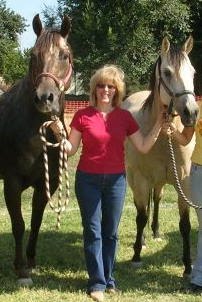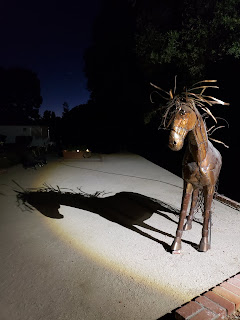Every night, after the challenges of the day, I "escort" the 3 little doggies outside for their nightly pee. They're so funny how they won't "do their business" without me actually walking out with them. But this is how I get to see and feel the magic of night. This is how I get to see and feel the moon, that most miss, by going to bed early. My nightly routine has become me putting Jim to bed, sometimes easy, sometimes an ordeal... more an ordeal when I am not well from weekly chemo side effects. You know that feeling when you Just Want To Be In Bed.... Like Now! And you don't want to deal with Any Thing Else? That's my Tuesday and Wednesday nights. The yucky side effects creeping in, dragging me down, sucking me into awfulness. Nausea, achyness, swollen, bloat, that metallic taste in my mouth, headachy. That over-all chemo crash yuckiness, the punched in the gut, I might get "sick" feeling,... but when I'm outside, no matter how awful I feel, the moon and the beauty of the night, somehow replenishes my spirit and gives me hope to move forward to yet another day.
Thanks for checking in and following my ongoing Myeloma cancer blog, which I began June 2010, to document my "summer vacation" at City of Hope Hospital for my Autologous Stem Cell Transplant. I hope you enjoy my candid musings and treatment status updates. Please comment so I know you've stopped by! Look for my 2021 status updates on the 1's, but I'll surprise you and post in-between :)) Thanks for reading, caring and commenting!

Cowgirl Up!!! ... Does Horse Poop Cause Cancer??
Thursday, September 19, 2019
9.19.19 ... 9.9 Years and Counting Towards 10
Every night, after the challenges of the day, I "escort" the 3 little doggies outside for their nightly pee. They're so funny how they won't "do their business" without me actually walking out with them. But this is how I get to see and feel the magic of night. This is how I get to see and feel the moon, that most miss, by going to bed early. My nightly routine has become me putting Jim to bed, sometimes easy, sometimes an ordeal... more an ordeal when I am not well from weekly chemo side effects. You know that feeling when you Just Want To Be In Bed.... Like Now! And you don't want to deal with Any Thing Else? That's my Tuesday and Wednesday nights. The yucky side effects creeping in, dragging me down, sucking me into awfulness. Nausea, achyness, swollen, bloat, that metallic taste in my mouth, headachy. That over-all chemo crash yuckiness, the punched in the gut, I might get "sick" feeling,... but when I'm outside, no matter how awful I feel, the moon and the beauty of the night, somehow replenishes my spirit and gives me hope to move forward to yet another day.
Helpful Myeloma Links
- American Cancer Society- Multiple Myeloma
- American Society of Hematology
- Amgen
- Ask Dr Durie
- Cancer Therapy Advisor - MM
- Chemo Care- Drug definitions
- Cytoxan
- Darzalex
- Dexamethasone Steroids
- Health Monitor Magazine
- International Myeloma Foundation
- Kyprolis
- LLS- Myeloma
- MM resources
- Multiple Myeloma Research Foundation
- Myeloma Beacon
- Myeloma Blogs
- Myeloma Central
- Myeloma Crowd
- Myeloma Symptoms
- OncLive
- Patient Power
- Pomalyst
- Revlimid
- Support Groups
- Understanding Multiple Myeloma
- Velcade
My Story... How my MM was diagnosed
My treatment trail ride forks to City of Hope hospital as I will saddle up beginning June 9, 2010 for a new rodeo called an Autologous Stem Cell Transplant!
Chemical Warfare...
My initial chemo regimen:
Pill form Chemo= Revlimid (10mg, 15mg capsules)
Allopurinol- keeping the kidneys healthy
Acyclovir- anti-Shingles, anti-viral
June 2010:
High dose IV Cytoxan chemo
Neupogen to build up stem cells for Apheresis, stem cell harvest, which was very successful, as City of Hope was able to collect 9.5 million of my own stem cells
July 2010 Hospitalization:
Two days of high dose Melphalan chemo
Then July 5, 2010 = my Autologous Stem Cell transplant infusion!
And you can read my whole story from that point forward in this blog!
What is multiple myeloma?
What is multiple myeloma?
Cancer starts when cells in the body begin to grow out of control. Cells in nearly any part of the body can become cancer, and can spread to other areas of the body. To learn more about how cancers start and spread, see What Is Cancer?
Multiple myeloma is a cancer formed by malignant plasma cells. Normal plasma cells are found in the bone marrow and are an important part of the immune system.
The immune system is made up of several types of cells that work together to fight infections and other diseases. Lymphocytes (lymph cells) are the main cell type of the immune system. The major types of lymphocytes are T cells and B cells.
When B cells respond to an infection, they mature and change into plasma cells. Plasma cells make the antibodies (also called immunoglobulins) that help the body attack and kill germs. Lymphocytes are in many areas of the body, such as lymph nodes, the bone marrow, the intestines, and the bloodstream. Plasma cells, however, are mainly found in the bone marrow. Bone marrow is the soft tissue inside some hollow bones. In addition to plasma cells, normal bone marrow has cells that make the different normal blood cells.
When plasma cells become cancerous and grow out of control, they can produce a tumor called a plasmacytoma. These tumors generally develop in a bone, but they are also rarely found in other tissues. If someone has only a single plasma cell tumor, the disease is called an isolated (or solitary) plasmacytoma. If someone has more than one plasmacytoma, they have multiple myeloma.
Multiple myeloma is characterized by several features, including:
Low blood counts
In multiple myeloma, the overgrowth of plasma cells in the bone marrow can crowd out normal blood-forming cells, leading to low blood counts. This can cause anemia – a shortage of red blood cells. People with anemia become pale, weak, and fatigued. Multiple myeloma can also cause the level of platelets in the blood to become low (called thrombocytopenia). This can lead to increased bleeding and bruising. Another condition that can develop is leukopenia – a shortage of normal white blood cells. This can lead to problems fighting infections.
Bone and calcium problems
Myeloma cells also interfere with cells that help keep the bones strong. Bones are constantly being remade to keep them strong. Two major kinds of bone cells normally work together to keep bones healthy and strong. The cells that lay down new bone are called osteoblasts. The cells that break down old bone are called osteoclasts. Myeloma cells make a substance that tells the osteoclasts to speed up dissolving the bone. Since the osteoblasts do not get a signal to put down new bone, old bone is broken down without new bone to replace it. This makes the bones weak and they break easily. Fractured bones are a major problem in people with myeloma. This increase in bone break-down can also raise calcium levels in the blood. (Problems caused by high calcium levels are discussed in the section “How is multiple myeloma diagnosed?”)
Infections
Abnormal plasma cells do not protect the body from infections. As mentioned before, normal plasma cells produce antibodies that attack germs. For example, if you developed pneumonia, normal plasma cells would produce antibodies aimed at the specific bacteria that were causing the illness. These antibodies help the body attack and kill the bacteria. In multiple myeloma, the myeloma cells crowd out the normal plasma cells, so that antibodies to fight the infection can’t be made. The antibody made by the myeloma cells does not help fight infections. That’s because the myeloma cells are just many copies of the same plasma cell – all making copies of the same exact (or monoclonal) antibody.
Kidney problems
The antibody made by myeloma cells can harm the kidneys. This can lead to kidney damage and even kidney failure.







Hi Julie, Thank you for your honest, encouraging, sometimes sad, sometimes funny, sometimes vulnerable posts. I want to share my dad's story to encourage you to keep on writing and encouraging all who read with your skills at making us feel like we are sitting in your kitchen with you having a conversation. My dad's health began to fade several years before he passed. For his family and friends that knew him long term, the last year of his life we watched as his health failed, sometimes daily. He had lost most of his sight so could not drive or read anymore, lost some hearing, and was in and out of the hospital on a regular basis. Once he died we had a memorial service for him and after the family shared their thoughts they opened up to anyone who wanted to share about my dad. One man came to the microphone who had only know my dad 1 year. The year the family and friends had seen his life deteriorate on almost daily. This man shared how my dad was such an inspiration to my dad and saw him on Sundays when my dad went to church. Needless to say he did not see my dad 52 times as he was not always able to be there. But the man shared that if he saw Stan in church in spite of his challenges, what excuse did he have to not be in church when he was healthy and had no excuses. He said knowing my dad made him a better person. That was quite a surprise but such a blessing to know my dad's life was still impacting people who were in his life. I say all this, Julie, because your blogs are so encouraging, uplifting, inspiring, because of your honesty and transparency. Thank you for continuing to bless all of us who read your story and share your life with us. You may not know who you are encouraging today, but we are there. Love you.
ReplyDeleteHi CB :)) Wow! your comment really touched my heart! Thank you so much for sharing your Dad's story... see he is STILL making a difference in the world! What a wonderful story this is, and his life. Sorry I did not have a chance to know him... I deeply appreciate you taking the time to write as you did, and detail your feelings to me as you have. Means the world to me!! xoxo
ReplyDeleteActually there are times I think I am writing to outer space, and maybe I shouldn't post so often... as you have said, I really don't "know who (I am) encouraging today, but we (you) are there" ... This is such a timely and heartfelt reminder and encouragement to continue writing CB! I wonder how much, how deep, how detailed, etc I should share, but your post encourages me to continue to be REAL and write from the heart CB! Thank you so very much for taking the time to share your story and feelings with me, really really means a lot... I'll keep on sharing... Thank you!!
Hoping you are doing well, and all is good with you and your family! xoxo :)) xoxo